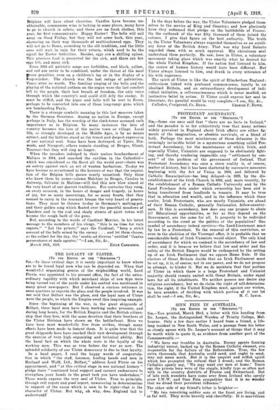THE LOYALTY OF ULSTER. (To THE EDITOR or THE "
SPECTATOR.") Sut,—In these critical days it is surely important to know where are to be found loyal men who can be depended on. When that wonderful organizing genius of the shipbuilding world, Lord Pirrie, was appointed to his present office, the fact of the extra- erdinary rapidity with which merchant ships of new type were being turned out of the yards under his control was mentioned in many great newspapers. But I observed a curious reticence in some quarters as regards the place and the people involved. It was sot said that Belfast was the place, and the loyal men of Ulster were the people, to which the Empire owed this inspiring example. Since the beginning of the war, in the great shipyards of Belfast, these loyal men have been working under pressure, and during long hours, for the British Empire and the British citizen- ship that they love, with the same devotion that their brothers of the Ulster Division have shown on the battle-front. Here we have been most wonderfully free from strikes, though many efforts have been made to foment them. It is quite true that the great shipyards here have reached their vast development through the exercise of very high organizing and technical ability. But the basal fact on which the whole rests is the loyalty of the working men. This was as true before the war as now. The splendid solidarity of our Ulster democracy is due to that loyalty.
In a local paper, I read the happy words of congratula-
tion in which "the staff, foremen, leading hands and men in Harland and Wolff, Ltd., Belfast," address Lord Pirrie on his appointment, and "at this critical stage in our national history" pledge their "continued loyal support and earnest endeavours to strengthen your hands in the great task you have undertaken." Those words express the very soul of Ulster. True to principle, through evil report and good report, unwavering in determination in support of the cause which is seen to be right—that is the character of Ulster. But why, oh why, does England fail to understand?
In the days before the war, the Ulster Volunteers pledged them. selves to the service of King and Country; and how gloriously have they redeemed that pledge on the battlefields of France. On the outbreak of the war fifty thousand of them joined the colours. I give that figure on the best authority. The truth is, the Ulster Volunteers always regarded themselves as an auxili- ary force of the British Army. That was why Lord Roberts regarded them with so much approval. His chivalrous soul understood them perfectly. He saw, here in Ulster, a voluntary movement taking place which was exactly what he desired for the whole United Kingdom. If the nation had listened to him, the course of human history would have been different. But Ulster always listened to him, and drank in every utterance of his with eagerness.
The spirit of Ulster is like the spirit of Elizabethan England : enthusiasm linked with profound common-sense, loyalty to an idealized Britain, and an extraordinary development of indi- vidual initiative, a self-consciousness which is never morbid, an instinctive belief in action. If Ulster could express her soul in literature, th3 parallel would be very complete.—I am, Sir, &c.,


























 Previous page
Previous page